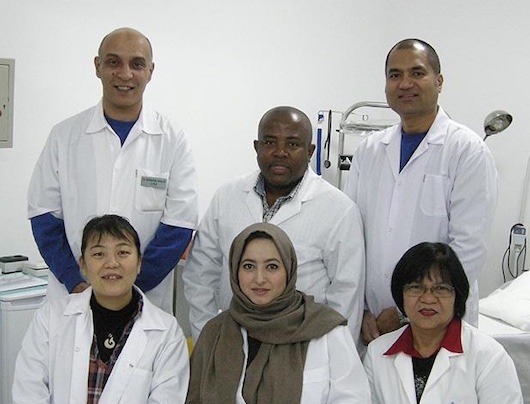Dr. Khalid Eddahiri, upper left of this photo and Humanitarian Health Conference participant, describes his job as “Serving the people who serve the world”. Since 2008, Dr. Eddahiri leads the United Nations as the Medical Desk Officer for UN Agencies, Funds and Programs. He worked primarily in West and East Africa providing support to 43 field clinics, 10 UN Peacekeeping clinics, and over 700 individual healthcare workers – as well as playing an integral role in aiding the UN’s response to the Ebola crisis. In 2012, Dr. Eddahiri became the Chief Medical Officer for the UN Nations Mission to Libya during the aftermath of the NATO campaign. Dr. Khalid Eddahiri already had extensive experience serving the medical needs of impoverished communities but assessed that INMED’s Professional Certificate would add knowledge that would benefit his passion in bringing quality health care to at-risk populations.
During his time at an INMED Training Site in war-torn Yemen, Dr. Eddahiri provided key insight into the operations and management of the clinic and improved the Mass Casualty and Medical Evacuation Plan – all while creating an extensive gap analysis and health support plan. Dr. Eddahiri also treated patients daily and offered second opinions on complex cases presented to the training site. In Yemen it also came to Dr. Eddahiri’s attention that there were no female physicians serving. Dr. Eddahiri was passionate that the clinic must strive to add female staff and stated, “The most important requirement,” he says, “is communication and cultural awareness. We cannot in 2020 deploy a full clinic in a Muslim country composed with males only. That is not acceptable and offending.” After bringing this to the attention of the staff, the clinic became committed to better female representation and the issue was corrected by hiring a woman as the Chief of Medicine.
Dr. Eddahiri will be taking part in the Humanitarian Health Conference on June 11-12. Please join us, virtually or in-person, and sample his passion to bringing justice to persecuted medical professionals who often face death and destruction by choosing to serve impoverished and war-torn communities.

